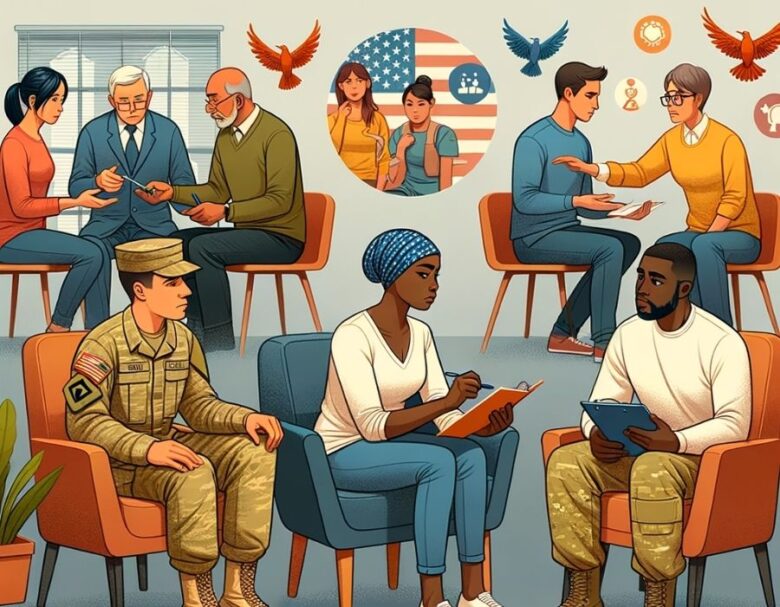Transitioning from military to civilian life is a significant journey that can present unique mental health challenges for veterans. This comprehensive guide explores the common mental health issues faced by veterans, provides coping strategies, and outlines the various resources available to support your mental well-being during this transition.
Understanding the Mental Health Challenges of Transition
The shift from military to civilian life can be more complex than many anticipate. It’s not just a change of job, but a complete lifestyle transformation that can impact mental health in various ways.
Common Mental Health Challenges:
- Post-Traumatic Stress Disorder (PTSD)
- Depression
- Anxiety
- Adjustment Disorder
- Substance Abuse
- Identity Issues
Remember: Experiencing mental health challenges during transition is common and does not reflect weakness.
Recognizing the Signs of Mental Health Issues
Identifying mental health concerns early can lead to more effective treatment and smoother adjustment.
Signs to Watch For:
- Persistent sadness or irritability
- Difficulty sleeping or oversleeping
- Loss of interest in activities once enjoyed
- Feelings of hopelessness or worthlessness
- Increased use of alcohol or drugs
- Difficulty concentrating or making decisions
- Physical symptoms without clear causes (headaches, digestive issues)
- Thoughts of death or suicide
If you’re experiencing thoughts of suicide, call the Veterans Crisis Line immediately at 1-800-273-8255 and Press 1.
Coping Strategies for a Smooth Transition
Developing healthy coping mechanisms can significantly ease the transition process.
Effective Coping Strategies:
- Establish a Routine: Structure can provide a sense of purpose and normalcy.
- Stay Physically Active: Regular exercise can improve mood and reduce stress.
- Practice Mindfulness: Techniques like meditation can help manage anxiety and stress.
- Connect with Other Veterans: Sharing experiences can provide validation and support.
- Set Realistic Goals: Break down larger goals into manageable steps.
- Pursue Hobbies: Engaging in enjoyable activities can boost mood and provide a sense of accomplishment.
- Maintain a Healthy Diet: Proper nutrition supports overall mental health.
- Limit Alcohol Consumption: Excessive drinking can exacerbate mental health issues.
Tip: Try different strategies to find what works best for you. It’s okay to adjust your approach over time.
Seeking Professional Help
Professional mental health support can be crucial in navigating the challenges of transition.
Types of Mental Health Professionals:
| Professional | Focus Area |
|---|---|
| Psychiatrist | Can prescribe medication and provide therapy |
| Psychologist | Provides therapy and psychological testing |
| Licensed Clinical Social Worker | Offers counseling and case management |
| Licensed Professional Counselor | Provides various forms of therapy |
Don’t hesitate to seek professional help. It’s a sign of strength, not weakness.
VA Mental Health Services
The Department of Veterans Affairs offers a wide range of mental health services for veterans.
VA Mental Health Resources:
- Outpatient and inpatient care
- Specialized PTSD treatment programs
- Substance use disorder treatment
- Suicide prevention services
- Telehealth options for remote care
To access VA mental health services, start by enrolling in VA health care or contacting your local VA medical center.
Vet Centers
Vet Centers provide a range of counseling, outreach, and referral services to combat veterans and their families.
Vet Center Services:
- Individual and group counseling
- Family counseling
- Bereavement counseling
- Military sexual trauma counseling
- Substance abuse assessment and referral
Vet Centers offer a more informal atmosphere and are separate from VA medical centers.
Non-VA Mental Health Resources
Several non-VA organizations offer mental health support for veterans.
Key Non-VA Resources:
- Give an Hour: Provides free mental health care to veterans and their families.
- The Soldiers Project: Offers free, confidential psychological services to post-9/11 veterans.
- Wounded Warrior Project: Provides various programs, including mental health support.
- National Alliance on Mental Illness (NAMI): Offers education, support, and advocacy for mental health.
These organizations can be particularly helpful if you’re not eligible for VA care or prefer non-VA options.
Peer Support Programs
Connecting with other veterans who have gone through similar experiences can be incredibly beneficial.
Peer Support Options:
- VA Peer Support Specialists
- Vet-to-Vet support groups
- Online veteran communities
- Local veteran meetup groups
Peer support can provide understanding and validation that friends and family, while well-meaning, may not be able to offer.
Family Support and Involvement
Family support can be crucial in maintaining mental health during transition.
Ways Families Can Help:
- Educate themselves about transition challenges
- Attend counseling sessions together
- Encourage open communication about feelings and experiences
- Be patient and understanding during the adjustment period
- Help create a structured home environment
Remember: Your transition affects your family too. Open communication is key.
Addressing Stigma Around Mental Health
Overcoming the stigma associated with seeking mental health care is an important step in getting help.
Strategies to Combat Stigma:
- Educate yourself and others about mental health
- Share your own experiences (if comfortable) to normalize seeking help
- Challenge negative stereotypes when you encounter them
- Remember that seeking help is a sign of strength, not weakness
Your willingness to seek help can inspire others to do the same.
Incorporating Mindfulness and Relaxation Techniques
Mindfulness and relaxation techniques can be powerful tools for managing stress and improving mental well-being.
Mindfulness Practices to Try:
- Meditation
- Deep breathing exercises
- Progressive muscle relaxation
- Yoga
- Guided imagery
Many VA facilities offer mindfulness classes specifically for veterans.
Maintaining Physical Health
Physical health and mental health are closely linked. Taking care of your body can significantly impact your mental well-being.
Tips for Physical Health:
- Regular exercise (aim for at least 30 minutes a day)
- Balanced diet rich in fruits, vegetables, and whole grains
- Adequate sleep (7-9 hours per night)
- Regular medical check-ups
- Limit alcohol and avoid tobacco
Consider joining a veteran-focused fitness program to combine physical activity with peer support.
Frequently Asked Questions
Q: How long does it typically take to adjust to civilian life? A: The adjustment period varies for each individual. It can take anywhere from a few months to several years. Be patient with yourself and remember that it’s a process.
Q: Can I access mental health services if I’m not eligible for VA healthcare? A: Yes, there are numerous non-VA resources available, including non-profit organizations and community mental health centers.
Q: Will seeking mental health care affect my ability to own firearms? A: Generally, seeking mental health care alone does not affect firearm ownership rights. However, if you’re deemed a danger to yourself or others, there may be restrictions.
Q: How do I know if I have PTSD or if I’m just having trouble adjusting? A: While adjustment difficulties are common, PTSD has specific symptoms and diagnostic criteria. A mental health professional can provide an accurate diagnosis and appropriate treatment plan.
Q: Can my family members access mental health support? A: Yes, many VA programs and non-VA organizations offer support services for family members of veterans.
Conclusion
Adjusting to civilian life after military service is a significant transition that can present various mental health challenges. However, with the right resources, coping strategies, and support systems, you can successfully navigate this journey and thrive in your civilian life.
Remember that seeking help for mental health concerns is not a sign of weakness, but a step towards strength and resilience. The skills and discipline you developed in the military can be powerful tools in addressing mental health challenges and building a fulfilling civilian life.
Take advantage of the many resources available to you, whether through the VA, non-profit organizations, or community programs. Don’t hesitate to reach out for support when you need it, whether that’s professional help, peer support, or family involvement.
Your mental health is a crucial component of your overall well-being and success in civilian life. By prioritizing your mental health and utilizing available resources, you’re setting yourself up for a smoother transition and a more satisfying post-military life. Remember, you’re not alone in this journey, and support is always available when you need it.




